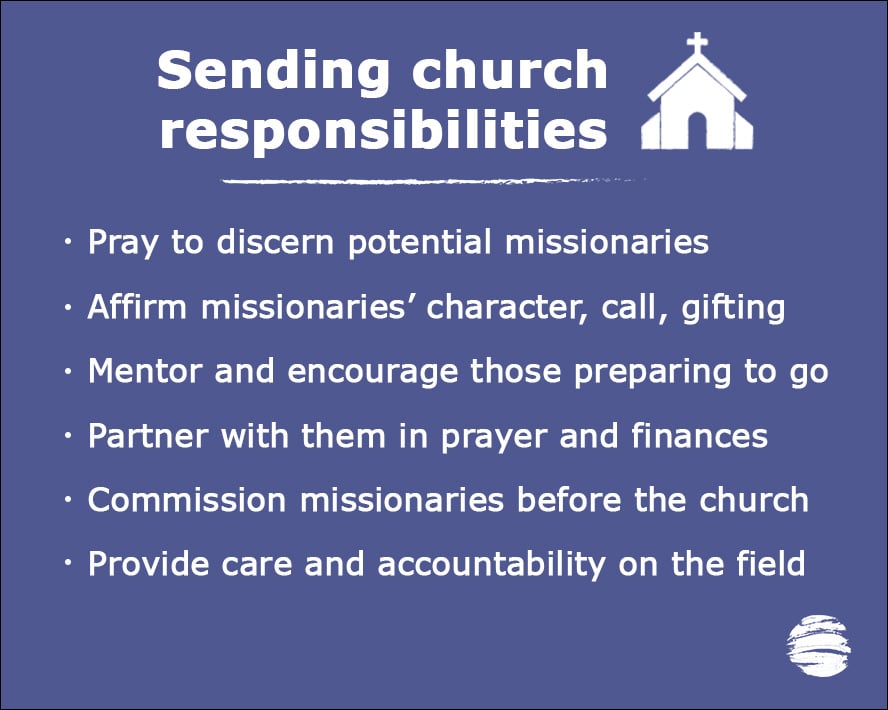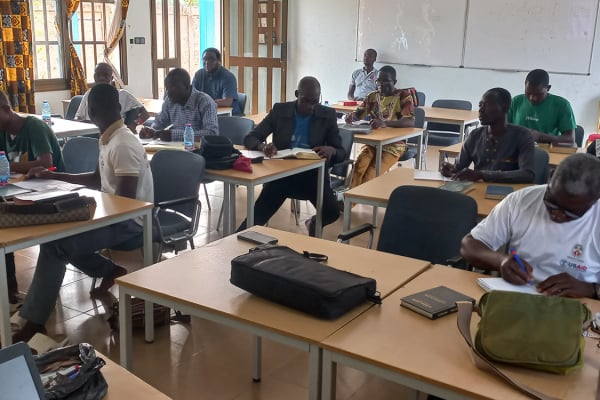
How to Be a Sending Church for Missionaries
Behind every effective missionary is a faithful sending church. It’s true — the local church is a vital partner for the global worker and can be a key to their success.
Jesus gave his Great Commission mandate to the church. Mission agencies like Crossworld have a role to play, but it’s ultimately the responsibility of the church to make disciples of all nations by sending and supporting disciple-makers.
But what does it mean to be a sending church? Does it mean writing a check every month and sending a short-term team every summer? Do you need a global missions strategy? How do you even decide when a potential missionary is ready to go? And how do you care for them when they are on the ground?
We’ll explore all of these questions and more in this article. Whether you’re a pastor, missions team leader, or a regular member eager to see your church be more involved in the Great Commission, this guide will help you connect missions with your local church in meaningful, sustainable ways.

 Sending missionaries? This PDF guide gives you ideas about how to care for them before, during, and after their service.
Sending missionaries? This PDF guide gives you ideas about how to care for them before, during, and after their service.

What does it mean to be a sending church?
Being a sending church is more than being a supporting church. Whereas a congregation might be a supporting church for many global workers by giving financially, they’re likely the sending church for fewer missionaries — perhaps only ones that came out of the church. From the worker’s perspective, a missionary might have a handful of supporting churches but probably only has one sending church.
More than simply funding a missionary’s work, a sending church takes ownership in identifying, developing, affirming, and commissioning missionaries, plus supporting them as they serve on the mission field, according to Bradley Bell in his book The Sending Church Defined.
Remember the church at Antioch in the book of Acts?
Now there were in the church at Antioch prophets and teachers, Barnabas, Simeon who was called Niger, Lucius of Cyrene, Manaen a lifelong friend of Herod the tetrarch, and Saul. While they were worshiping the Lord and fasting, the Holy Spirit said, “Set apart for me Barnabas and Saul for the work to which I have called them.” Then after fasting and praying they laid their hands on them and sent them off. — Acts 13:1-3, ESV
The church at Antioch became the sending church for Saul (Paul) and Barnabas. From the church, we see:
- Spiritual discernment through prayer and fasting
- Public commissioning with the laying on of hands
- Ministry accountability (Acts 14:26–27)
With the church at Antioch as our model, we learn that being a biblical sending church is more than logistical support — it’s about spiritual partnership and responsibility in fulfilling the Great Commission.
Other sending church responsibilities:
- Affirming character, call, and gifting of potential missionaries
- Mentoring those who are preparing to go
- Encouraging workers as they raise support and complete missionary training
- Partnering with them financially and in prayer
- Caring for them on the field and when they return home

That’s a lofty picture of a sending church, and one worth aspiring to. But if you’re a small church or just starting out toward missions, it may feel overwhelming. How do you get there? Where do you begin?
Let’s look at several stages in a sending church’s journey and how you can apply them.
Creating a missions culture in your church
Sending missionaries starts with prioritizing missions. The potential global workers sitting in the pews each Sunday are unlikely to upend their lives unless they’re being inspired and challenged to go.
Is missions regularly talked about in your church, or do you focus solely on local outreach? You should emphasize local outreach, but not to the neglect of the nations.
Here are some ways to focus on missions during your church’s worship service.
- Sing songs about God’s glory among all people and our global task. (Here’s an example: “For the Cause” by Keith & Kristyn Getty)
- Preach about God’s heart for all nations, seen throughout Scripture.
- Invite visiting missionaries to speak to the congregation.
- Pray corporately for unreached people groups. Here are ways to pray for the nations.
- Start an annual giving campaign toward a missions project.
- Pray for God to raise up missionaries in your church.
- Challenge attendees to pray about whether God is calling them to go.
Crafting your church’s global missions strategy
You might start out pursuing any missions opportunity that comes your way. That’s not a bad way to get going! But you might soon find there are simply too many good opportunities and you need to be more strategic to focus on the best ones.
It’s good to be intentional about what you get involved in, but don’t develop such a rigid structure that you can’t bend toward the Holy Spirit’s leading. Remember, it was the Spirit (not the church’s strategy) who initiated the sending of Paul and Barnabas from the church at Antioch.
Here are some questions to discuss as you pursue a global missions strategy.
- Is there a particular part of the world or type of ministry that suits your church?
- Do you already have connections to build on?
- What are your church’s values, and what opportunities align with those?
- Will you send short-term teams from your church? If so, what will be their purpose?
- What characteristics or experience are you looking for in long-term workers you send?
- Will you send and support workers who are not members of your church?
- What are your expectations of those you send?
- Are there specific missions agencies you want to partner with, or will you let the workers choose?

The most strategic thing you can do to be a sending church is to pray.
Identifying and preparing missionaries from your church
The most strategic thing you can do to be a sending church is to pray. Pray for God to send out workers from your church (Matthew 9:38). The church at Antioch was praying and fasting when they heard the Holy Spirit’s voice to send Paul and Barnabas. Are you regularly praying and fasting, listening for the Spirit’s voice?
As you emphasize missions in your church culture and seek God’s leading for those in your church, he will begin to stir in people’s hearts a desire to go. What then?
Have a plan for affirming and preparing those who express interest in missions. It can be formal or informal but should include a spiritual assessment and checklist for missionary training (which may be in partnership with a missions organization like Crossworld).
Here are some things to evaluate in potential missionaries:
- Spiritual maturity and biblical knowledge
- Disciple-making effectiveness
- Cross-cultural experience
- Character, including willingness to learn and grow
- Lifestyle of service
Be sure that pre-deployment training includes at least these elements:
- Spiritual mentorship
- Disciple-making
- Culture and language study
- Conflict resolution
- Global security
Sending someone to the mission field unprepared can be catastrophic. Be prepared to say “not yet” to someone who wants to go but isn’t ready, and then walk alongside them to encourage growth in the areas they need to work on so that they will be ready in the future.
Want help creating an assessment and training plan for your church? Invite our team to host a Preparing Disciple-Makers training with your church leaders.
Sending out missionaries with a commissioning service
When a worker from your church is ready to be sent to the mission field, that’s cause for celebration! Yes, it’s bittersweet; you’ll feel their absence, but you can also rejoice that your church’s ministry now extends around the globe.
Host a missionary sending service to commission them to the work of the Lord, as the church at Antioch did when they laid hands on Paul and Barnabas. Inviting the worker’s extended family to be part of the service is a special way to honor those the worker is leaving behind.
Here are some things to pray for as you commission new missionaries:
- The transition to a new culture
- Good relationships with local and teammates
- Protection from the enemy
- Sensitivity to the Holy Spirit
- Courage to proclaim the gospel
- Perseverance in the work
- Spiritual fruit that lasts
Download a complete commissioning service guide from TEAM.

Your church’s ministry extends to the globe when you send out your own workers with an official missionary commissioning service.
Caring for missionaries you’ve sent from your church
When a worker from your church arrives on the mission field, your partnership has really just begun! They need your support now more than ever as they adjust to their new home.
Rally a care team to support each worker you send. The care team should be the worker’s advocates in the church — staying in touch, relaying prayer requests, and coordinating help for any needs they have.
Here are practical ways to care for your missionaries:
- Pray regularly for them and their ministry
- Ask questions about their life and ministry
- Speak/write words of encouragement
- Volunteer your skills to help with practical needs
- Visit them in their country
- See more ways to support missionaries
Partnering with a missionary sending agency
What does it look like to work with your worker’s missions agency as an effective sending triangle (the worker, the church, and the agency)? For starters, it should be a partnership. Both the church and the agency bring vital pieces to the table that complement each other.
The church:
- Knows the worker best with a deep personal relationship
- Is the worker’s primary support system, financially and emotionally
- Has received authority from Jesus to fulfill the Great Commission
The agency:
- Understands the cultural and logistical challenges of serving abroad
- Has the framework to provide financial and legal services
- Provides counseling and care tailored directly to the worker’s needs
The church and the agency serve a missionary best when they work together. Take time to get to know your worker’s agency — the leadership, processes, and services. Share your church’s desires and care plan. Discuss who’s responsible for what and how you’ll collaborate on decisions — for example, when it’s time for a major ministry transition. There are no right or wrong answers, but the more you communicate up front, the better partnership you’ll have in the long run.
Learn more about how Crossworld views partnership with the local church.
There’s nothing magical about the methods of being a sending church. Still not sure where to start? Start with prayer, just like the church at Antioch.
Your journey as a sending church will be unique and beautiful. Let God stir your heart for his glory among the nations and seek his leading for your church. Then celebrate how he uses those in your midst to spread his gospel to all nations.
Want to talk about your church’s sending strategy? Connect with our team.

 Sending missionaries? This PDF guide gives you ideas about how to care for them before, during, and after their service.
Sending missionaries? This PDF guide gives you ideas about how to care for them before, during, and after their service.
.png)

 By Crossworld
By Crossworld











